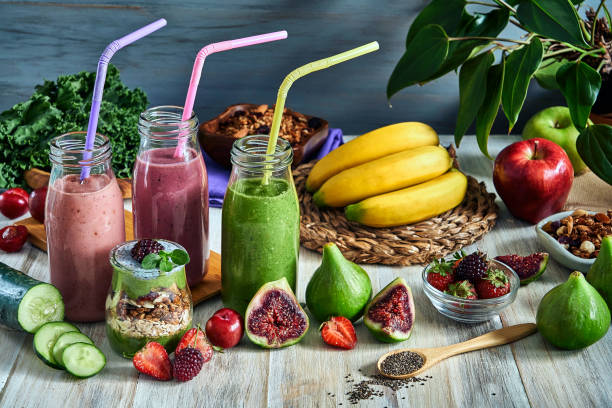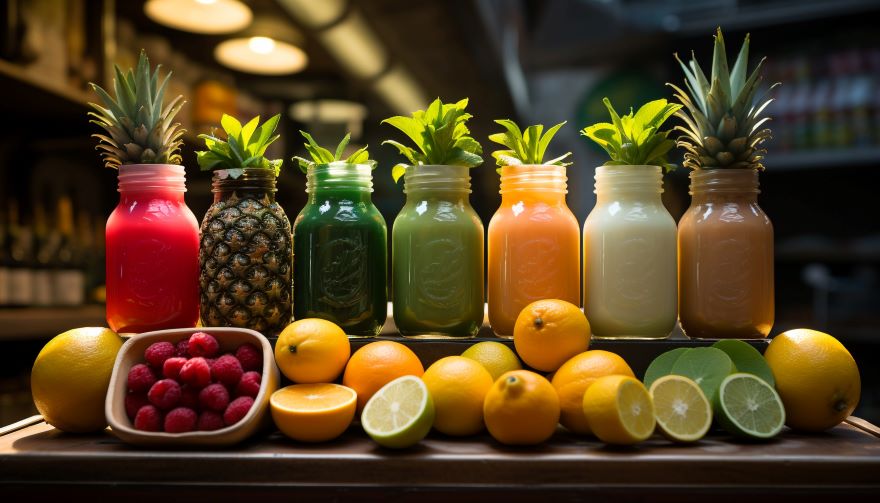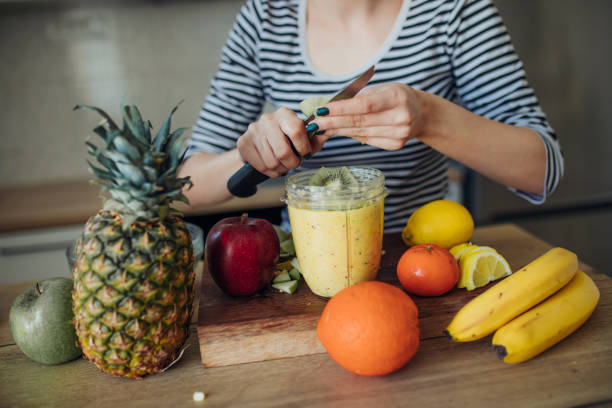Power Up Your Smoothie: Top Juices for Extra Nutrition
As a self-proclaimed smoothie connoisseur, let me share my hard-earned wisdom on finding the ideal juice to blend into your beverage of fruity goodness. That blended beverage has become my daily tonic since I jumped on the health kick a few years back. But let me tell you, it took some serious kitchen experimenting before I found smoothie perfection. This article will discuss some of the juicy secrets for crafting the most delicious blended beverages and their benefits.
Grab a straw and get ready! For a bright citrus kick, you can’t beat the classic orange juice. Craving tropical vibes? Reach for pineapple juice – it blends up insanely thick and creamy. But where I go rogue is with veggie juices like carrot and beet. That earthy yet sweet flavor is unmatched, plus the beet hue makes smoothies look like magic potions!
These days, I’m obsessed with liquid bases like coconut water for its nutty essence, or rich, velvety almond milk. The possibilities are endless for crafting a signature smoothie! So embrace the quest and let your taste buds run wild.

“A smoothie with banana, kale, blueberries, and almond milk is so good.” — Katia Winter
Considerations When Choosing the Right Juice for Smoothies
Imagine this, you’re whipping up a smoothie delight, but the wrong juice throws everything off. Using the wrong type of juice affects your smoothie’s taste, thickness, and nutrients.
Here’s what matters:
- Flavor: Fresh fruit juice is an excellent choice. It offers a vibrant taste and natural sweetness compared to the store-bought juice. You can turn a freshly squeezed pineapple, orange, or apple into a fruity fiesta without overpowering the other ingredients.
- Nutritional value: Don’t get tricked by sugary juices! Coconut water is an ideal smoothie base. It is not only refreshing and hydrating but also rich in nutrients like potassium and magnesium. Unsweetened almond milk is also a great, low-sugar option.
- Dietary restrictions: Lactose intolerant? I recommend non-dairy milk in your smoothies. Soy, almond, cashew, or oat milk offers a creamy texture while giving your body additional nutrients.
Remember, the right juice gives your smoothie a taste and health triumph. Now go forth and blend!
How Do Different Juices Affect the Taste of Your Smoothie?
Choosing the right juice can make a significant difference in the flavor, sweetness, and overall enjoyment of your smoothie.
- Citrus Juices: When I include juices, like orange, lemon, or lime in my smoothie it imparts a tangy and invigorating taste. These juices work well to balance the sweetness of fruits such as mangoes or bananas. However, it’s important to be mindful of the quantity used as an excess of citrus juice can overshadow flavors.
- Berry Juices: I enjoy incorporating berry juices into my smoothies for their hues and intense flavors. Cranberry, blueberry, or raspberry juice can introduce a sweetness, and tanginess that complements ingredients like spinach or kale. It’s advisable to start with a measured quantity since berry juices are highly concentrated. You can adjust the quantity according to your liking.
- Vegetable Juices: Vegetable juices like beet or carrot juice offer a dense foundation for my smoothies. They bring in sweetness and earthy notes that pair well with fruits such as apples or pears. Moreover, vegetable juices contribute to consistency for a satisfying texture.
- Exotic Fruit Juices: Sometimes, I experiment with exotic fruit juices for a unique taste. Pineapple, passion fruit, and guava juice bring a twist that takes my smoothie to a whole new level. It’s important to play around with different juice combinations to find the perfect mix, as not all exotic fruit juices blend well with every ingredient.

Health Factors to Consider When Choosing Juice
When choosing a juice for my smoothie, there are a few important health factors that I consider to ensure I’m blending the most nutritious and delicious concoction.
Sugar Content: Let’s be real, nobody wants a sugar bomb disguised as a smoothie. That’s why I go for low-sugar juice heroes like tart apple or tangy cranberry. They bring the sweetness without piling on unnecessary sugar grams.
Vitamin Boost: When selecting a juice, I don’t just look at the sugar content, I also consider the vitamin and mineral content. I look for juices rich in nutrients like vitamins A, C, K, calcium, and potassium from ingredients like carrots, beets, kale, and spinach.
Choose Organic: Alright, let’s talk about organic versus non-organic juices. Organic is great for avoiding synthetic pesticides, but it can get pricey. For fruits and veggies prone to pesticide contamination like strawberries and apples, I’ll splurge on organic juice. But for lower-risk produce like avocados or kiwis, I’ll go non-organic to save some cash. It’s all about balancing your priorities and budget.
Top Recommended Juices for Various Types of Smoothies
In this section, I’ll share my top recommended juices for various types of smoothies to help you find the perfect combinations for your taste buds and health goals.
Green Smoothies
When it comes to green smoothies, I highly recommend using a mixture of 100% fruit juice and water to avoid excess sugar while still enjoying a naturally sweet and refreshing taste. Some of my go-to juices for green smoothies include:
- Apple juice: Pairs well with leafy greens like spinach and kale, and adds natural sweetness without overpowering the smoothie.
- Orange juice: Complements fruits like mango, pineapple, and berries, and provides a significant boost of vitamin C.
- Pineapple juice: Adds a tropical twist and works well with greens such as kale or chard.
Protein Smoothies
For protein-packed smoothies, I like to keep the juice base light to let the protein source – whether it’s protein powder, Greek yogurt, or nut butter – shine through. Here are my top juice picks for protein smoothies:
- Coconut water: A hydrating, electrolyte-rich option that adds a subtle sweetness and complements protein sources like vanilla or chocolate.
- Almond milk: A dairy-free alternative that provides creaminess to smoothies with added protein from the almonds.
- Watermelon juice: A refreshing, hydrating choice that works well with fruit-based protein smoothies.
Detox Smoothies
When crafting detox smoothies, I opt for nutrient-rich, low-calorie juices that provide antioxidants and other health benefits. Some of the best juices for detox smoothies are:
- Beet juice: Packed with vitamins and minerals, beet juice adds an earthy sweetness and vibrant color to detox smoothies.
- Kale or spinach juice: Rich in iron and antioxidants, these green juices complement a variety of fruits and are great for detoxing.
- Ginger-turmeric juice: A potent anti-inflammatory combo that adds a zing to smoothies while supporting detoxification.
Energy Boosting Smoothies
If you require an energy boost, I recommend juices naturally high in vitamins and minerals to fuel your day. Here are my top choices for energy-boosting smoothies:
- Acai juice: A superfood powerhouse rich in antioxidants and nutrients to keep you energized throughout the day.
- Pomegranate juice: A sweet, tangy addition to smoothies that’s packed with antioxidants and vitamins.
- Orange or grapefruit juice: Citrus fruits are high in vitamin C and natural sugars, making them excellent choices for an energizing smoothie base.
By incorporating these suggested juices into different types of smoothies, I hope you discover exciting and delicious combinations to fuel your body and satisfy your taste buds.

How to Make Your Juice for Smoothies
Making fresh juice for smoothies is a simple and rewarding process. I handpick the juiciest, most vibrant fruits and veggies, preferably what’s in season. After giving them a good rinse to remove any dirt or residue, I prep them by peeling oranges, removing seeds, and chopping everything into juicer-friendly pieces.
Then comes the fun part – feeding the produce into the juicer and watching that liquid gold emerge. I love using a slow or cold-press juicer to extract every last drop of nutrient-packed goodness. While the juicer works its magic, I gather any extra ingredients like yogurt, ice, or protein powder.
With the fresh juice ready, I blend it all together until smooth and velvety. The final step? Enjoying my homemade, vitamin-packed smoothie – a little taste of sunshine in a glass!
Final thoughts
When it comes to finding the best juice for smoothies, there are several options available that I have found to be both delicious and nutritious. But my favorite blend allows me to achieve a complex and well-rounded flavor. Combinations like apple-cranberry, orange-pineapple, or kale-lemon create harmonious tastes that complement many ingredients. Don’t be afraid to experiment with different blends and proportions to discover your ideal smoothie concoction.
When it comes to smoothie bases, my top picks are soy milk, almond milk, and good old-fashioned water.
Soy Milk has a smooth and creamy texture, similar to cow’s milk. Its mild flavor complements well with various smoothie creations. Soy milk is an excellent alternative for those who are lactose intolerant or looking for a plant-based option.
Almond Milk is another dairy-free champ for smoothies, with a thinner texture than soy milk. Its subtle flavor pairs well with numerous smoothie ingredients and can be a great addition to your morning routine.
Of course, sometimes water is the best choice for a smoothie base. It’s calorie-free and sugar-free. It is the most versatile base and does not affect the taste of the other ingredients. Water allows you to experiment with different fruit and vegetable combinations without worrying about added sugars or flavors.
At the end of the day, it’s all about crafting a smoothie that’s both delicious and nutritious. With the right juice squad, I’m sipping on liquid gold that fuels my body right. A win-win for taste buds and overall well-being!

 Previous Post
Previous Post Next Post
Next Post